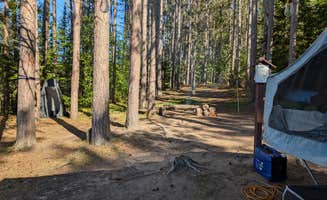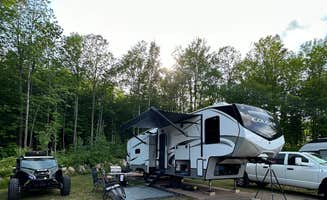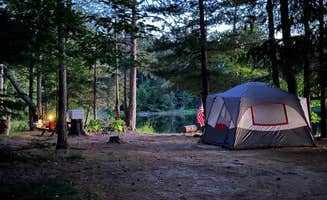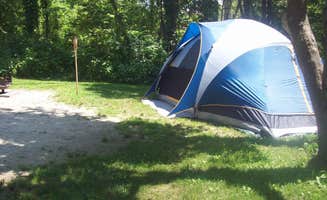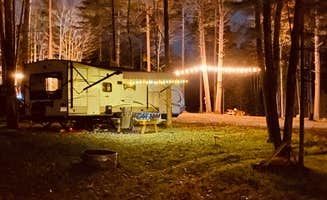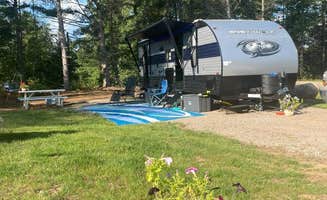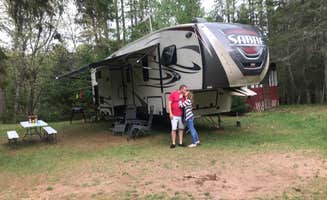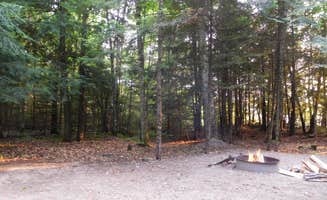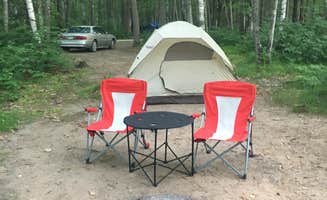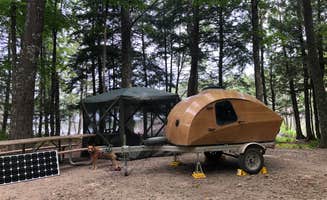The Chequamegon-Nicolet National Forest covers nearly 1.5 million acres across northern Wisconsin, with Hiles positioned centrally within its eastern portion. Winter temperatures in this region regularly drop below zero degrees Fahrenheit, while summer camping season brings average highs in the mid-70s. Many forest service roads leading to remote campsites become impassable after heavy rainfall, with clay-based soils creating challenging conditions even for 4WD vehicles.
What to do
Swimming in clear lakes: Franklin Lake features a designated beach area with amenities for day use visitors. "The water is crystal clear and there's a beach that can be used if you don't have a lake site," notes a Franklin Lake visitor. The sandy bottom makes it ideal for families seeking clean swimming conditions.
Paddling small lakes: The small, interconnected lakes provide excellent kayaking and canoeing opportunities. "I love this campsite. The small lake belongs to a pair of loons that will share their fish and sandy beach," writes a visitor about Wolf Lake Campsite, highlighting the wildlife viewing opportunities while paddling.
Hiking forest trails: Several hiking trails wind through diverse ecosystems, including bogs and pine forests. "This campground has our favorite hiking trail. The sites are spacious with privacy and shade," mentions a Luna White Deer Campground visitor about the trail circling the lake.
Fishing from shore: Many campgrounds offer direct shoreline fishing access without requiring a boat. A visitor notes, "White Deer lake had a nice swimming beach area, the trail around the lake had many sandy access areas that my husband enjoyed some shoreline fishing. He caught a 9 inch bass and some panfish."
What campers like
Privacy between sites: Many national forest campgrounds offer secluded sites with natural buffers. "Private sites, great beach, beautiful buildings built by the CCC. There is even a small nature center," notes a Franklin Lake visitor, highlighting the historic Civilian Conservation Corps structures that remain.
Dark night skies: Limited light pollution creates exceptional stargazing opportunities. "The stars at night are some of the best I've seen with little light pollution up there," shares a camper at Franklin Lake. The remote location contributes to these pristine night sky conditions.
Lake access for tent campers: Many sites include direct water access with dedicated tent pads near shorelines. At Woodbury Lake Campsite, "Nice spot to camp can fit trailer in parking area. There are two picknick tables and fire ring. Tent spot by lake boat access."
Wildlife viewing: Loons, eagles, and deer are commonly spotted from campsites. "The small lake belongs to a pair of loons that will share their fish and sandy beach," notes a Wolf Lake visitor, highlighting the quieter nature of smaller lakes for wildlife observation.
What you should know
Cell service limitations: Connectivity varies dramatically across the forest with many campsites offering no service. "Cell service is horrible, you can get service kind of by the lake depending on your provider, but don't count on it," warns a camper at Franklin Lake.
Water sources: Many rustic sites require bringing drinking water. At Laurel Lake Campground, one camper notes, "We stop here regularly to refill water jugs. The sites are wooded and private. The lake has clear water and a sandy bottom."
Insect preparation: Biting insects can be particularly intense in early summer. "Mosquitos were present, but not the worst I've ever experienced, the biting flies were plentiful, but stayed away with the help of a thermacell," shares a Luna White Deer Campground visitor.
Forest road conditions: Access to remote campsites can deteriorate quickly after rainfall. A visitor to Wolf Lake noted, "Small campsite along paved road, fire ring and picnic table, wilderness toilet. Stayed two nights in September it was quiet fishing was so so."
Tips for camping with families
Beach selection: For younger children, seek out lakes with designated swimming areas. "The site was mostly gravel with nice fire ring and picnic table," notes a camper at Franklin Lake Campground, where the beach area provides safer water access than sites on steeper shorelines.
Nature programs: Some campgrounds offer educational programming during peak season. "My family loves the nature trail that takes us through bogs and past maiden hair ferns," shares a visitor about Franklin Lake's interpretive offerings.
Trail difficulty: Many lakeside trails offer flat, accessible hiking for families with young children. "The trail around the lake had many sandy access areas that my husband enjoyed some shoreline fishing," reports a Luna White Deer Campground visitor, indicating multiple access points suitable for breaks with children.
Site selection for tent camping: Look for sites with level, dedicated tent pads. "The nicest thing about the campground is the few square-footages of level and compacted square on each site, ready to spread your tent on it," notes a camper at Laurel Lake Campground.
Tips from RVers
Site leveling challenges: Many forest campgrounds have uneven sites requiring leveling blocks. At Hiles Pine Lake Campground, "Owners are great, campground is clean and quiet, nice showers, not really a kids campground more like a relaxing or fishing campground," indicating its suitability for adult-focused RV camping.
Dump station access: Limited dump stations means planning disposal needs. One RVer noted about Holly Wood Hill Campground, "Dump site is unlevel and leans away from hose hookup making it difficult to fully flush holding tanks. Driveway to get in and out of dump site is rough and quite tight for a camper longer than 35ft to maneuver around."
Reservation requirements: Private campgrounds often require advance bookings while dispersed sites are first-come, first-served. "Small primitive campsites right on lake pine in a beautiful area. The site are adequate and nothing negative to report," notes a visitor to Nicolet National Forest Pine Lake Campground.
Access for larger rigs: Forest roads often limit accessibility for longer RVs. A visitor to Woodbury Lake noted, "This remote site has space for a trailer," but many forest sites specify limitations for vehicles over 25 feet.


